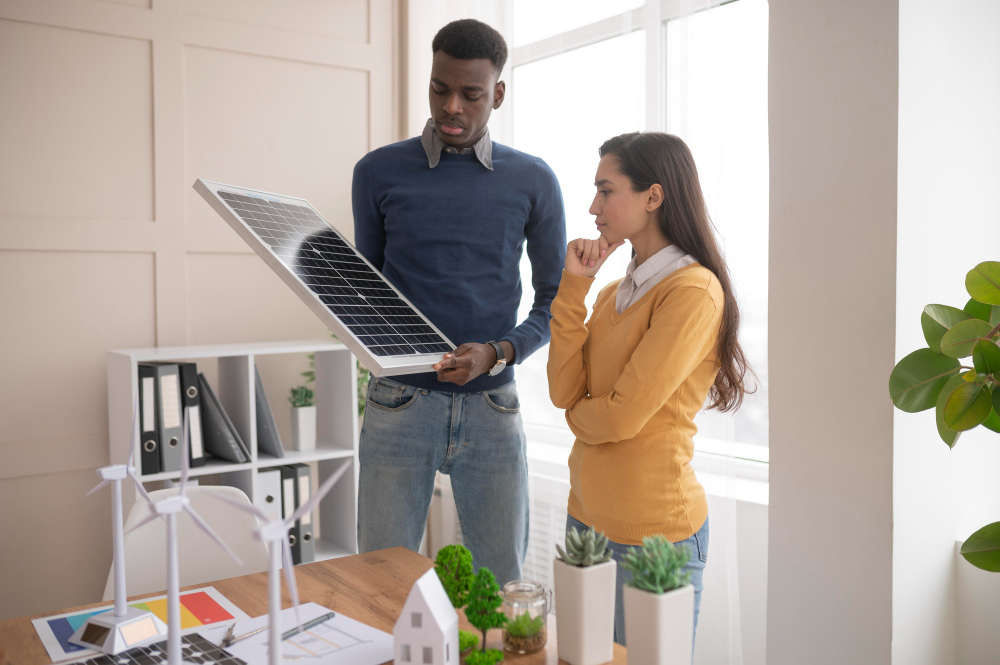The first thing you probably ask yourself when you decide to take out a Dutch mortgage is this: “Okay, so what can I afford to buy?” In other words, you want to know about your borrowing power.
In the Netherlands, there are several factors that will determine how much money a bank will lend you — and many of these are specific to when exactly you decide to take out a mortgage.
So, what’s your borrowing power in the Netherlands going to look like in 2025?
It’s a big question, so we decided to turn to the experts for an answer. We spoke with Henk Jansen from Expat Mortgages to get the best advice possible — dig in!
What is borrowing power?
Put simply, your borrowing power is the amount of money that you can afford to borrow to secure a Dutch mortgage.
This is determined based on a number of factors:
- Your gross annual income. Yep, that’s right, gross. While only a certain amount of your income may be landing in your bank account, when calculating your borrowing power, your net income plus the tax you pay will be considered. Why? Because the interest paid on a loan for a property in which you live is tax-deductible.
- The term of the mortgage. How long you decide you want your mortgage term to be will also affect your borrowing power. In the Netherlands, the standard mortgage term is 30 years. While there are shorter terms that you can choose, it’s worth noting that the shorter the term of the mortgage, the lower your borrowing capacity. This is because you will have to pay higher monthly costs in order to pay off the mortgage within a shorter term.
- The interest rate. The higher the mortgage interest rate, the lower your borrowing capacity. If the interest is higher, less of your woonquote (income that can be spent on housing) can go towards capital repayment, so you can borrow less.
Good to know: If you have a partner, their income will also be considered. Since 2023, this second income will account for 100% of the calculation (as opposed to 90% in previous years).
Changes for your Dutch borrowing power in 2025
As we said above, your borrowing power will also be affected by the climate in which you decide to take out a Dutch mortgage. So, what’s different in 2025?

Dutch mortgage interest rates are decreasing
Depending on the economic outlook in the EU, the European Central Bank (ECB) is expected to decrease interest rates in the coming year, with ABN AMRO predicting that both short-term and long-term mortgage interest rates will continue to decrease in 2025.
READ MORE | Which experts can save you money when buying a house in the Netherlands?
What could these lower rates mean for your borrowing power in 2025? Put simply, you can put more money towards your mortgage!

How does this work?
In the Netherlands, mortgage interest rates are influenced by three things:
- The loan-to-value ratio (LTVR) or risk category and
- The fixation period, i.e. the period of time the client chooses to fix the rate
- The interest rates of the bank you loan money from
The loan-to-value ratio (LTVR) sounds tricky, but it’s actually quite simple.
For example: If a house is worth €350,000 and you want to take out a loan for €350,000, then your LTVR is 100%. This means that your LTVR also falls into the high-risk category.
And the result? You will have to pay higher mortgage interest, which in turn lessens your borrowing power.
This is why lower mortgage interest rates increase your borrowing power.
The level of risk involved in loaning you money for a mortgage in the Netherlands is also increased by inflation. Something that the Netherlands has seen plenty of in the past few years. As the cost of living rises, so does the risk involved in loaning money.
It’s worth noting that while lower mortgage interest rates mean higher borrowing power, it often also leads to higher housing prices.
But a good deposit could save you
On the other hand, if you decide to finance more of your bid yourself, you’ll actually benefit from better borrowing power.
For example: If €50,000 of your bid comes from your own savings, then your LTVR is only 85%.
By offering to pay more of your own contribution towards your house, you reduce your monthly costs, your risk category, and in turn, your interest rate. Ta-da! That gives you higher borrowing power.
READ MORE | What costs do you pay when buying a house in the Netherlands?
Lower monthly costs? Yes! You’re paying back a lower mortgage because you have already partially paid for your home. On top of this, as a result of opting for lower-risk, you also benefit from a lower interest rate.
Sustainable measures remain very important
As we all know, energy in the Netherlands is expensive. Henk from Expat Mortgages has seen how this interacts with the housing market.
“We see a lot of people looking for sustainable measures to reduce energy costs and be less dependent on, for example, gas,” he tells us.

Not only are sustainable housing options a good move to consider when you already own a home, but also when you’re looking to buy one.
READ MORE | How will my student debt affect my chances of getting a mortgage in the Netherlands?
If you wish to make sustainable changes to the home you are interested in buying, then you actually increase your borrowing power.
As of January 2024, home buyers in the Netherlands could borrow more money to purchase a home and improve its energy label. In 2025, this continues to play an important role in how much you can borrow towards a mortgage.
Just how much extra money you can borrow is determined by where the house’s energy label falls:
- The lower the energy rating, the more money you can borrow to implement energy-saving measures in the home.
- The higher the energy rating, the more you can borrow to purchase the home.
When it comes to the amount that you can borrow to purchase the house, the higher the energy rating, the more money you can borrow.
| Energy label | Extra money to implement energy-saving measures | Extra money to purchase the home |
|---|---|---|
| E, F and G energy label | €20,000 | €0 |
| C or D energy label | €15,000 | €5,000 |
| A or B energy label | €10,000 | €10,000 |
| A+ or A++ | €10,000 | €20,000 |
| A+++ | €10,000 | €30,000 |
| A++++ | €0 | €40,000 |
| A++++ with at least a 10-year energy performance guarantee | €0 | €50,000 |
The NHG limit has gone up, while the contribution has gone down
As of January 2025, you can now take out a mortgage with the National Mortgage Guarantee (NHG) for homes with a purchase price of up to €450,000, including renovation costs, or €477,000 if you plan on taking energy-saving measures.
READ MORE | What is the Dutch National Mortgage Guarantee (NHG)?
In order to take out a mortgage with the National Mortgage Guarantee, you must pay a contribution. In 2025, this contribution amount is dropping from 0.6% to 0.4%
For example, if you wanted to take out a mortgage of €450,000 with the NHG in 2025, this will cost you €1,800 instead of €2,700.
Singles can borrow €17,000 more than couples
If you are single and not looking to mingle, you don’t have to give up on your dream of owning a home. In fact, this year, your borrowing power just increased (again).
In January 2024, single people in the Netherlands with an income of at least €28,000 became eligible to borrow an extra €16,000 towards buying a home. In 2025, this amount has increased to €17,000.
By increasing their borrowing power, the Dutch government hopes to give singles a fighting chance in the Dutch housing market.
Whether or not your wages increase is very important in 2025
According to the National Institute for Budget Information (NIBUD), unless your wages increase in 2025 by the expected 4.3%, your borrowing power will likely decrease this year.
As Nibud director Arjan Vliegenthart explains: “A household that currently has an annual income of €70,000 can borrow approximately €7,000 more in 2025 with the average wage increase. Without a wage increase, this household would actually be able to borrow €6,000 less.”
Advice from a mortgage expert

So, what should you do with this information? The best thing is to listen to the experts.
I know what I want to do, now what?
Expat Mortgages have tailored their skills for internationals in the Netherlands. Reach out to them now to organise a free-of-charge appointment with an expert. Curious what your borrowing power could be? You can use this mortgage calculator tool to give you a rough idea!
Henk from Expat Mortgages has been working in the mortgage industry for nearly 30 years and has helped countless people (especially expats) buy houses in the Netherlands.
Here’s what he had to say.
Understand how mortgage interest rates will impact your borrowing power
One thing that is certainly going to impact your borrowing power is mortgage interest rates. And how much do you know about them? For example, do you know the difference between fixed and floating mortgage interest rates?
- A floating mortgage interest rate loan means that the interest rate will change slightly throughout the loan period. This change is based on fluctuations within the market.
- A fixed mortgage interest rate loan does what you imagine, the interest rate is fixed throughout the period of the loan.

Let’s talk about fixed mortgage interest rate loans.
When considering whether or not you want to opt for a fixed mortgage interest rate, it’s important to take the current mortgage interest rates into consideration. Henk says there are two things to note:
- Firstly, higher mortgage rates mean higher monthly costs. However, it’s worth remembering that these are tax-deductible, meaning you have a higher tax advantage. A lower interest rate means lower monthly costs, but you also deduct less from your taxes.
- Secondly, a higher mortgage interest rate also means you will have a slightly lower borrowing power, while lower interest rates will lead to more borrowing power.
So, what about floating mortgage interest rates? This is where Henk turns the conversation to internationals in the Netherlands.
What should international homebuyers in the Netherlands consider?
“One thing that is worth considering as an international in the Netherlands is a floating mortgage interest rate,” Henk tells us. But why?

Well, as an international, you are less likely to want a 30-year fixed mortgage loan. After all, you may decide further down the line that you want to move back to your home country.
“In this case, you’re better off taking advantage of a floating mortgage loan and the lower interest rates that accompany it,” Henk explains.
This way, you can enjoy higher borrowing power when entering the Dutch housing market.
Are you an international who has bought a home in the Netherlands recently? Tell us about your experience in the comments below!

I think that taking a risk with no money down or less than 20% is very risky.
Never do an adjustable mortgage. Lock in with the highest down payment you can
You want to live not merely survive!
Even as a Dutchman, this international perspective is very valuable to me. Thanks, Sarah!
We bought house on 2022 end and for us floating interest is at 4.9% and it seems to increase all the way! Where is this 2% floating ok interest? Did I take something wrong? I took from ABN Amro